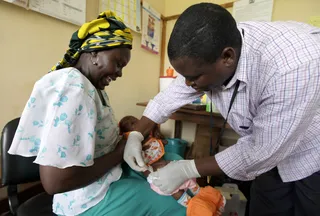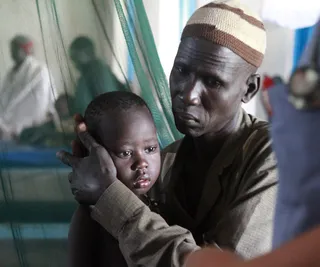World Malaria Day 2013: The Year in Malaria
The year’s biggest advances in the fight to end malaria.

1 / 10
Intro: The Year in Malaria - Malaria is a sometimes deadly disease caused by a parasite carried by mosquitoes. Although preventable and treatable, the disease still affects more than 200 million each year and causes hundreds of thousands of deaths in sub-Saharan Africa. In honor of World Malaria Day 2013 on April 25, BET.com takes a look at some of the biggest advances in the fight against malaria from the past year. (Photo: Getty Images/Flickr RF)

2 / 10
Malaria Is Going Down - The World Health Organization says malaria mortality rates in Africa have decreased by a third since 2000. (Photo: REUTERS/Finbarr O'Reilly)
Photo By Photo: REUTERS/Finbarr O'Reilly

3 / 10
Eat Your Anti-Malarials? - Last May, biologists at UC San Diego found that algae can be engineered to produce an edible vaccine that blocks malaria transmission. (Photo: REUTERS/Zohra Bensemra)

4 / 10
Malaria Task Force on the Move - A coalition of U.S. representatives, experts in malaria programs and chiefs of medical services from eight African nations came together in Accra, Ghana, one day ahead of World Malaria Day 2013 to share knowledge, experiences and best practices during a three-day meeting of the West Africa Malaria Task Force. (Photo: REUTERS/Jacquelyn Martin/Pool)

5 / 10
Toast to the Eradication of Malaria - A study funded by the Bill & Melinda Gates Foundation found that baker’s yeast, a key ingredient in most bread and beer production, can be engineered to produce Artemisinin, an ingredient found in some of the most effective anti-malaria drugs. (Photo: Dorling Kindersley/GettyImages)
ADVERTISEMENT

6 / 10
Wash Malaria Down the Drain - Moctar Dembele and Gerard Niyondiko, two students from Burkina Faso, recently won the Global Science Venture competition for their anti-malaria, mosquito repellent soap from herbs and citronella. (Photo: REUTERS/Jim Young)

7 / 10
Closer to a Vaccine - Researchers working on a malaria vaccine say one could be ready as early as 2015.(Photo: REUTERS/Joseph Okanga)
Photo By Photo: REUTERS/Joseph Okanga

8 / 10
New Technology - Although insecticide-treated mosquito nets have been used for years as an inexpensive malaria prevention measure, the nets usually had an expiration date indicating when the insecticide wore off. Now, a new company says it is close to rolling out a net that has insecticide weaved deep into the net’s fibers; ensuring many years of effective use.(Photo: REUTERS/Philimon Bulawayo)

9 / 10
Tongue Spray for Tots - An Australian pharmaceutical company announced that it is close to rolling out an under-tongue spray that they claim is more effective than intravenous quinine (the traditional treatment) in treating children with malaria. (Photo: REUTERS/Margaret Aguirre/International Medical Corps/Handout)
Photo By Photo: REUTERS/Margaret Aguirre/International Medical Corps/Handout
